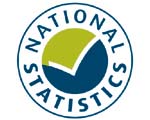Waiting times for suspected and diagnosed cancer patients: quarter ending December 2011
 The latest quarterly national statistics on NHS cancer waiting times produced by the Department of Health were released on 25 November 2011 according to the arrangements approved by the UK Statistics Authority.
The latest quarterly national statistics on NHS cancer waiting times produced by the Department of Health were released on 25 November 2011 according to the arrangements approved by the UK Statistics Authority.
Following an independent assessment undertaken in 2010, the United Kingdom Statistics Authority has designated these statistics as National Statistics, in accordance with the Statistics and Registration Service Act 2007 and signifying compliance with the Code of Practice for Official Statistics.
The key results for outpatient services and first definitive treatments show that, in England during the period October to December 2011:
Two week wait
- Two week wait – 96.2% of patients were seen by a specialist within two weeks of an urgent GP referral for suspected cancer – (95.7% in Q2 2011-12)
- Breast symptom two week wait – 96.3% of people urgently referred for breast symptoms (where cancer was not initially suspected) were seen within two weeks of referral (96.0% in Q2 2011-12)
One month (31-day) wait
- One Month (31-day) wait – 98.5% of patients began first treatment within 31 days of diagnosis, for all cancers – (98.4% in Q2 2011-12)
- One Month (31-day) wait – 99.2% of patients began first treatment within 31 days of a diagnosis of breast cancer – (99.3% in Q2 2011-12)
- The proportion of patients treated within 31 days of diagnosis for various cancer types is as follows:
- Lung cancers – 99.2%treated within 31 days ofdiagnosis
- Lower gastrointestinal cancers – 98.5%
- Urological cancers – 97.0%
- Skin cancers – 98.5%
Two month (62-day wait)
- Two Month (62-day wait) – 87.9% of patients began first treatment within 62 days of an urgent GP referral for suspected cancer, for all cancers – (87.3% in Q2 2011-12)
- Two Month (62-day) wait – 98.0% of patients began first treatment within 62 days of an urgent GP referral for suspected cancer, breast cancer – (97.5% in Q2 2011-12)
- The proportion of patients treated within 62 days of an urgent GP referral for various cancer types is as follows:
- Lung cancers – 83.3% treated within 62 days of an urgent GP referral for suspected cancer
- Lower gastrointestinal cancers – 78.4%
- Urological cancers (excluding testicular cancers) – 84.7%
- Skin cancers – 97.7%
31-day wait for second or subsequent treatment
- 31-day wait – 97.6% of people were treated within 31 days where the subsequent treatment was surgery – (97.7% in Q2 2011-12)
- 31-day wait – 99.8% of people treated within 31 days where the subsequent treatment was an anti-cancer drug regimen – (99.8% in Q2 2011-12)
- 31-day wait – 98.6% of people treated within 31 days where the subsequent treatment was a course of radiotherapy – (98.2% in Q2 2011-12)
62-day wait extension
- 62-day wait – 94.0% of people began first treatment within 62 days following a consultants decision to upgrade a patient’s priority, for all cancers – (93.4% in Q2 2011-12)
- 62-day wait – 94.5% of people began first treatment for cancer within 62 days of referral from an NHS cancer screening service, for all cancers – (93.2% in Q2 2011-12).
Data quality issues
The Department of Health is aware of data quality problems concerning the availability of data on cancer waiting times for Imperial College Healthcare NHS Trust. These problems, which are being investigated at this time, concern the failure of Imperial College Healthcare NHS Trust to upload complete records for the patient care they delivered to the Cancer Waiting Times Database (CWT-Db) for the month of December. This means these data are not available to local commissioners, cancer registries or the Department of Health for inclusion in these statistics.
This data quality issue is unlikely to have a significant impact on the nationally reported levels of activity and performance within these statistics. However, as pathways of care for cancer patients in this locality often start at one provider and end with specialist treatment at Imperial College Healthcare NHS Trust detailed data for this trust, and neighbouring providers should be treated with caution. The data series likely to be affected in this manner are:
- the two month (62-day) wait from urgent GP referral for suspected cancer to first definitive treatment for all cancers;
- the one month (31-day) wait from urgent GP referral for suspected cancer to first definitive treatment for rarer cancers;
- the 62-day wait from referral from an NHS cancer screening service to first definitive treatment for all cancers; and
- the 62-day wait for first definitive treatment following a consultants decision to upgrade a patients priority
Download Detailed tables: Quarter 3, 2011-12 (XLS, 2490K)
Download pre-release access list (PDF, 18K)
Download Cancer Waiting Times commentary Q3 2011-12 (PDF, 76K)
Cancer Waiting Times: csv files
Download Two week wait – all cancers (csv 25K)
Download Two week wait – exhibited breast symptoms (csv 27K)
Download Two week wait – suspected cancer (csv 262K)
Download Wait first treatment – rarer cancers (csv 42K)
Download Wait for anti-cancer drug treatments (csv 63K)
Download Wait for first treatment – all cancers (csv 66K)
Download Wait for first treatment – by cancer (csv 322)
Download Wait for first treatment from consultant upgrade – all cancers (csv 61K)
Download Wait for first treatment from screening referral services – all cancers (csv 59K)
Download Wait for radiotherapy treatments (csv 28K)
Download Wait for treatment through surgery (csv 53K)
Download Wait for urgent GP referral – by cancer (csv 367K)
Download Wait for urgent GP referral – all cancers (csv 74K)
